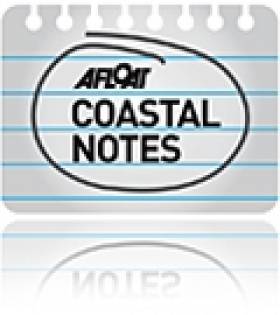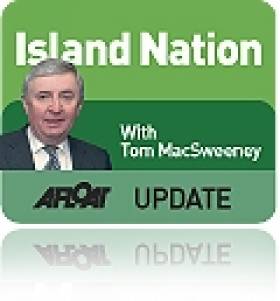Displaying items by tag: Eamon Gilmore
Tánaiste Signs New Maritime Boundary Agreement
#MaritimeBorder - Tánaiste and Minister for Foreign Affairs Eamon Gilmore has signed a new agreement that establishes a fixed maritime boundary between the UK and Ireland's offshore areas, as The Irish Times reports.
Gilmore put pen to paper on the deal with British ambassador to Ireland Dominick Chilcott that finalises a single boundary between the Exclusive Economic Zones (EEZ) and continental shelves of both countries.
The agreement is expected to ease development of offshore energy projects, as well as improve fisheries protection and marine conservation in the EEZ, which lies above the continental shelf between 12 and 200 nautical miles off the coast.
However, despite the new deal, Ireland and Britain's differing claims over Rockall in the North Atlantic remain.
The small rocky islet, 228 nautical miles northwest of Donegal, is also claimed by Denmark and Iceland.
Minister Rejects Public Inquiry into Dublin Bay Oil Drilling
#DALKEY ISLAND PROSPECT – Environment Minister Phil Hogan has rejected a call by Tánaiste Eamon Gilmore and others for a public inquiry into Providence Resources foreshore licence application to survey and drill for oil and gas in Dublin Bay, the Irish Times reports.
Mr Hogan has said that as the application by Providence Resources for survey and drilling work 6kms off Dalkey Island was the subject of public consultation, he did not consider a public inquiry "necessary".
Tánaiste and Labour Dún Laoghaire TD Eamon Gilmore said earlier yesterday that Mr Hogan should exercise his right to hold an oral hearing under the foreshore legislation. Last month, the Green Party and a number of residents in the Dalkey area also called for an inquiry.
Speaking in Galway yesterday, Mr Gilmore acknowledged that a "couple of wells" had been drilled in Dublin Bay previously, but there were a "lot of issues" relating to the current application.
To read more about this story click HERE
Marine is Back
It is a reminder which I hope that the media in general will note and that his tile of Marine will be used as often as agriculture is. The general media has been notorious, in my view, for disregarding the marine sector unless there is disaster, emergency or controversy involved.
The return of the title 'Marine' to a Government Department is, to put it bluntly, a kick-in-the-ass which civil servants needed. It was a betrayal of this island nation's heritage when those in charge of the former Department of Transport held a meeting which decided to remove the title marine from the Department's name, even though the then Minister had been assigned the role of Minister for Transport and Marine. The man in charge of that Department, Noel Dempsey, did not demonstrate a lot of interest in the marine, being more noted for trying to shut down the coastal radio stations at Valentia and Malin, where he was beaten off by public opposition, which also happened when he tried to remove 24-hour rescue helicopter service in the south-east and for his introduction of laws which criminalised fishermen.
Hopefully, the restoration of 'Marine' to a Department's name will be the harbinger of better things for the marine sphere.
I have heard some disappointment expressed that the marine is not a department on its own, but what the Fine Gael and subsequently Coalition Programme for Government agreed by Enda Kenny and Eamon Gilmore said was: "Marine responsibilities will be merged under one Department, for better co-ordination in policy delivery."
They have been, though some of the finer detail remains to be seen, such as will the ports be moved away from Transport, to where port companies and commercial interests originally campaigned to have them moved? And how will the split of marine tourism work between Agriculture and Marine and the separate tourism department? A similar issue may arise in regard to sailing and sport, but it seems to me a positive step that the disregard which Fianna Fáil and the Greens showed for the marine sector is being changed.
It was also right to end a separate department for defence. With a small army and navy, smaller than the marine sector, it was nonsense that it should have been a department of its own.
Let us therefore, hope for the future and take a positive view of the change as being for the better.
Programme for Government will Reinstate Marine Department
It maybe the second last item on the programme for government issued by Enda Kenny and Eamon Gilmore yesterday but the indications are good that the marine sector will see a reinstated Department of the Marine. the Fine Gael and Labour coalition say 'marine responsibilities will be merged under one Department, for better co-ordination in policy delivery'. Here is the relevant excerpt:
Coastal communities, fisheries & marine environment
We will negotiate the best possible deal for fishermen in the review of the Common Fisheries Policy.
We will support the development of sustainable aquaculture and fish farms by streamlining the licensing process and reducing associated bureaucracy.
Marine responsibilities will be merged under one Department, for better co-ordination in policy delivery. We will develop an integrated marine and coastal planning process in order to maximise the potential of Ireland's coastline in fishing, aquaculture, ocean energy and tourism.
A Sea Fisheries Sustainability Impact Assessment, based on consultation with all major stakeholders, will be brought before the Dáil annually before EU fisheries negotiations commence.
We will replace criminal sanctions system for minor fisheries offences with administrative sanction system to bring Ireland into line with other European jurisdictions. Safety at sea and decent working conditions must underpin the development of the fisheries sector. We will explore the provision of an emergency towing vessel for the Coastguard.

































































